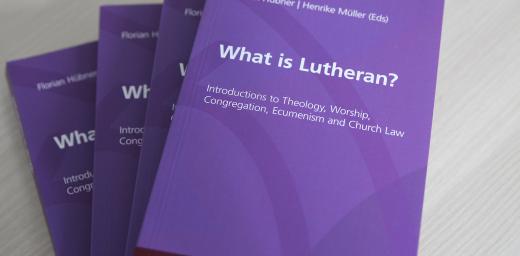LWF Council Statement on Religious Freedom
Ms Mikka McCracken (left) presented the public statement on religious freedom. © LWF/S. Gallay
LWF Council – LWI Press release 11/2013
Religious Intolerance Has Been a Source of Untold Violence
GENEVA, 20 June 2013 (LWI) – At its 2013 meeting, the Council of The Lutheran World Federation (LWF) called upon its member churches and the ecumenical community to strengthen their commitment to freedom of religion and belief.
In a Public Statement adopted at the 13-18 June meeting in Geneva, the Council noted that in many countries of the world the freedom of people to practice their religion freely was being curtailed or denied. Religious intolerance has been a source of untold violence and immeasurable human suffering up to this very day, the LWF governing body stated.
Approving the statement presented by the Committee for Advocacy and Public Voice, the Council called upon LWF member churches and the ecumenical community “to redouble their efforts and to cooperate widely in promoting and defending religious freedom in their own societies and internationally, including the freedom of public and private worship in the form and language of their choice.”
The LWF and its member churches were urged to intercede with both state and religious authorities for the defense “of individuals or groups whose rightful religious freedoms are being curtailed or denied, including the right to change religions and the right to wear or display religious symbols.”
Worrying Situation in Many Countries
The public statement emphasized the devastating effects of limitations on religious freedom and religious intolerance. In recent times violent riots against churches in Indonesia, Tanzania and Nigeria have been observed, affecting also LWF member churches. During its sessions the Council heard reports from Council members from those churches about the situation in their own countries. In other countries, laws have been passed in order to settle scores with religious minorities.
A Long Tradition of Engagement
The Public Statement that was unanimously adopted by the Council outlined for the first time in a comprehensive way all the diverse position statements of the LWF concerning freedom of religion and belief.
The statement highlighted the fundamental engagement of the LWF with the right to religious freedom since its founding. Even before the adoption of the Universal Declaration of Human Rights in 1948, the LWF at its first Assembly in 1947 in Lund advocated that refugees and minorities should be allowed to practice their religion in their own mother tongue and according to the practices of their own Confession. The Lutheran pastor Frederik Nolde was credited as being the main drafter of Article 18 of the human rights declaration, in which religious freedom is laid down.
Support for the United Nations
Alongside the call to the churches, the Council also affirmed LWF’s cooperation and support for the United Nations mechanisms to protect and extend religious freedom. It underscored the important role of the UN Special Rapporteur on Freedom of Religion or Belief.
The statement reiterated the need to campaign for religious freedom in cooperation with others across religious boundaries. The LWF governing body called upon all Lutherans and other people of faith around the world to pray for all those who suffer due to the lack of freedom of religion or belief.
Public Statement on Freedom of Religion or Belief





